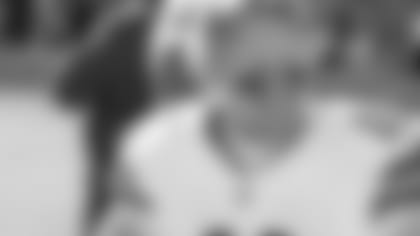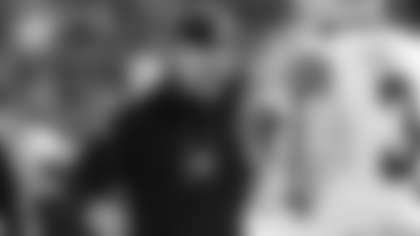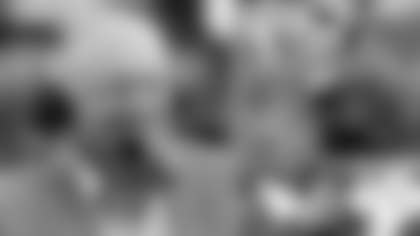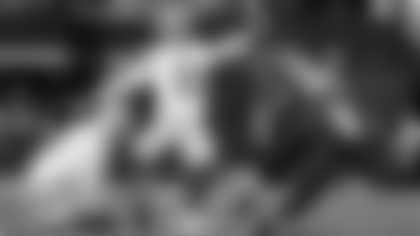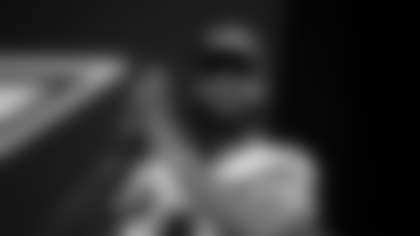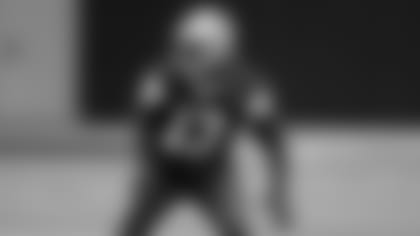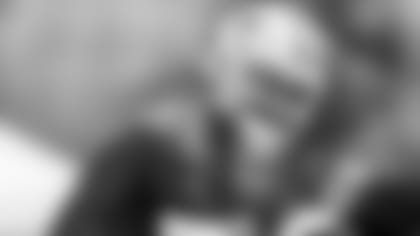This story originally appeared in Dallas Cowboys Star Magazine. For subscription information, please click here.
It's lunchtime and the practice fields are virtually deserted, but Cowboys receiver Cole Beasley is being double-teamed. A walk-through has ended and Beasley's teammates have long since decamped to the locker room, leaving the diminutive receiver all alone in the middle of the field to handle a pair of interview requests.
Beasley is listed at 5-8, and that might be a stretch. The hulking presence of the likes of DeMarcus Ware and Jason Hatcher has been replaced by a couple of un-athletic media types, and Beasley stills looks undersized by comparison. The questions are always the same, but Beasley takes no offense when he is again asked how it is that someone so small has any business playing so well among the Titans and Giants of the NFL.
"Actually," Beasley says matter-of-factly in a honey-dripped Texas twang, "Having a lot of quickness is a big advantage."
Growing up in Kingwood and then Little Elm, Beasley wasn't so much a football fan as he was a football savant. His father, Mike, was the head coach at Little Elm, and Cole got around-the-clock tutelage on the game's finer points. While his high school teammates went home and played video games, Beasley went home and watched film.
Maybe that's why Beasley, who had 15 catches after earning a roster spot with the Cowboys as an undrafted free agent last season, takes a businesslike approach to the game. Unlike so many other kids growing up in Texas, the star on the Cowboys helmet did not mesmerize Beasley. Instead, the game's unlikeliest stars captivated him. He took notice of Wes Welker in Miami in 2005, then became a Patriots fan when the Texas Tech product began teaming up with Tom Brady in New England two years later. [embedded_ad]
"As I got older and I knew what my playing style was," Beasley says, "I started to drift toward players like Wes Welker and shorter receivers like that. I was playing quarterback in high school but I knew I wasn't going to be that tall so I would have to play receiver. I watched Welker and Steve Smith and people like that. I liked the Patriots a lot because of the offense they ran. Their offense was made for guys like me with a lot of quickness."
As a coach's kid, Beasley watches the game with an analytic bent. He says the success of demitasse-sized receivers like Welker, Smith and, yes, Beasley in a Venti-sized league is no great mystery.
"The NFL recruits a lot of these really big guys that can run," Beasley explains. "But there is rarely ever a time when you run 40 yards untouched in the NFL. To me, the shuttle is more important than the 40. The 40 is important to see how a guy can run, but everybody coming up in the league is pretty fast. Quickness helps a lot."
While the 24-year-old Beasley has sure hands and runs good routes, he believes quickness is the asset that allowed him to reach the NFL, and keeps him there. He has been clocked with a 4.40 time in the 20-yard shuttle.
"Teams worry about the health factor," Beasley says. "When you are quick, it's hard for a lot of guys to get good shots at you, so I think that helps a lot, too."
Beasley's résumé is a Texas football fanboy's dream: Golden gridiron god as quarterback at Little Elm High School; go-to wideout at SMU; possession receiver with the Cowboys.
Growing up, Texas A&M was Beasley's favorite school, but he instead landed at SMU after June Jones arrived at University Park, figuring the passing game guru would best prepare him for the NFL.
"All my family went to A&M, so that's where I wanted to go," Beasley says. "Once I got into high school and I saw they were running the ball, I didn't want to go there anymore. I thought SMU would be a great place when June got there. I knew they would throw the ball a heck of a lot and I would get the best opportunity to make it to the NFL."
Beasley was right. He caught 173 passes for 2,100 yards in his final two seasons with the Mustangs. Things worked out for the best, even if it meant trading four years in a college town like College Station or Austin for the city life in Dallas.
"It's a great campus, but I'm not much of a city guy," Beasley says. "I kind of like being more to myself, so that was a little different. Dealing with all the traffic and stuff. It's not really a college town; you are right in the city. I don't really feel like I got to experience a real college life, but it was cool other than that."
SMU fans and Dallas residents need not feel slighted. Even his hometown, population 25,898, has grown too big, too fast, for Beasley's liking.
"When I first moved to Little Elm, it was a small town," Beasley says. "Then they threw up a bunch of houses, and it became one of the fastest growing places in Texas. It was the country when I first moved there. There was one stop sign. Then it moved to one streetlight. Now it's got too many of them. You can't even go anywhere, there are so many people. There is so much traffic."
Not a real shocker, then, that Beasley chose to make his living by staying out of traffic. What does surprise, however, is hearing Beasley say he's not really a football fan.
"I don't even watch football that much outside of playing," Beasley says. "I don't watch college football, either. The sport I watch the most is probably the NBA."
But the lifelong Texan is not a Dallas Mavericks fan. Nor a follower of the Houston Rockets or San Antonio Spurs.
"I don't not like the Mavericks," Beasley explains, "but I am a Kobe [Bryant] fan."
Bryant, of course, will never be considered the Wes Welker of the NBA. The Lakers star has been an MVP, led the league in scoring twice and earned All-NBA honors 11 times. But when Beasley watches Bryant, he sees something else. In Bryant, Beasley sees a hard-working overachiever.
"He is an assassin," Beasley says. "He will never back down from anybody. He's kind of flashy, but [Michael] Jordan was flashier than Kobe. I feel like Kobe is more fundamentally sound than I have seen in a lot of basketball players. You wouldn't really guess it because he is flashy, too. I like how good he is on offense; he can't be stopped one-on-one."
What Beasley really likes about Bryant, and why he relates to him, is because he is the hardest worker on his team. Beasley says a player of his smallish stature has to work twice as hard to get noticed.
"When you are a guy my size, a lot of people don't expect that much from you," Beasley says. "So really, you can't do anything just as good as everybody else. You have to exceed the expectation. When you are little, you have to go above and beyond to make teams. When you are a big guy, you can take a play off or make a bad play and still make the team just because of your potential. They don't normally look at guys like me as high-potential guys. You have to come out here and make plays, outwork everybody and show up on film as much as you can."
Cowboys head coach Jason Garrett agrees that Beasley sticks around because he does indeed show up, both in the video room and in person.
"The way he stays in this league is every day he catches five balls," Garrett told ESPNDallas.com last year. "Every day he beats a guy you don't think he can beat. And he does it today, tomorrow and the next day, the next day, the next day."
So, yes, Beasley shows up on film, but when he watches sports, he does so to learn. If it's pure escapism he's wanting, he's more apt to take in a movie. Comedies are his favorite, but he will watch anything if it's good.
"I can watch a chick flick, if it's entertaining."
Beasley is a big fan of Friday Night Lights, both the movie and the TV series. He watched every episode of the weekly drama, but because there was not a coach's kid in the show, he says he could not relate to any particular character.
When it is suggested to Beasley that he is a lot like Dillon High's Matt Saracen, he reacts with stone-cold silence. Beasley passed for 1,570 yards and tossed 12 touchdowns as a senior, but he also rushed for 1,184 yards with another 12 scores at Little Elm, so being likened to the soft-spoken everyman portrayed by Zach Gilford is no compliment.
"Uh," Beasley finally objects, "he wasn't really the best player on his team, I don't feel like. He was more like a guts and grit …"
Then it hits Beasley like a Tony Romo pass softly dropping into his hands. Maybe he does have something in common with Saracen, the undersized underdog who led the fictional Dillon Panthers to a Texas State High School title. Maybe Cole Beasley was the best player on his high school team, but the NFL is a long way from Little Elm. Maybe Cole Beasley is the Matt Saracen of the NFL.
"I mean, I guess I'm kind of like that," Beasley finally allows. "Just the way it's guts and grit and he's not really a high-potential type guy. Maybe you could see it like that, I guess, at this level. But in high school, I was one of the best."
So Beasley was more of a Tim Riggins, big-man-on-campus type in high school, and Little Elm is more of a suburb than a small-town. Regardless, Beasley says Friday Night Lights offered an accurate depiction of prep football in the Lone Star State.
"It was a little extreme in some stuff," Beasley says, "but for the most part, it was dead on. It's really like that. People in Texas are really extreme about their football. It's different in some places. Little Elm probably wasn't as serious about its football when I got there, but as we got better, I feel like it became more important to everyone in the city."
Like a lot of Texans, the Beasley family has football in its blood. Cole says living under the same roof as his high school coach was like being raised at a coaching clinic.
"When everybody else was going home, they were probably just eating, hanging out, playing video games," he says. "I'd get some of that, but my dad would come home and if I had done something in practice, we'd go over it and he would explain what he wanted. We would go over the upcoming team and the defenses they played, stuff like that. It was a lot of football at home."
Although football has never been his avocation, he can't imagine doing anything else as a vocation. Someday, he will trade his helmet for a whistle and follow his father into coaching.
"I can't really see myself doing anything other than football," he says. "I have been doing it all my life. My uncle is a retired coach. It runs in the family. Football is all I really know."
And, really, that's all you need to know about Cole Beasley.



